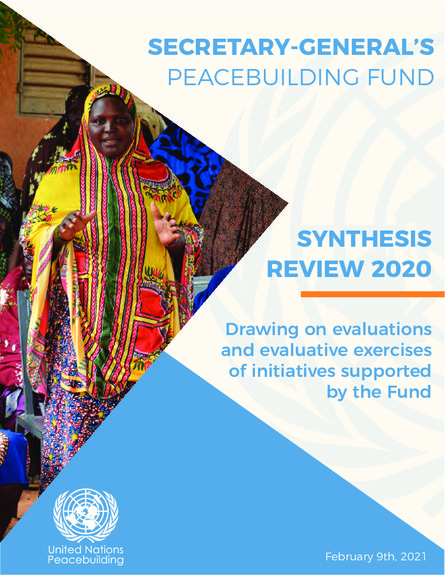
At the end of the 2017-2019 Strategic Plan, the United Nations Peacebuilding Fund (PBF) commissioned a Synthesis Review of approximately sixty evaluative exercises conducted at both portfolio as well as project levels during that period. The Synthesis Review report analyzed a range of findings emerging from the evaluative exercises, combined with recommendations for PBF and the wider UN system. In the Strategic Plan 2020-2024, the Fund committed to conduct Synthesis Reviews on an annual basis. This report represents a review of the 2020 evaluative exercises.
The key conclusions of the 2020 Synthesis Review of PBF-funded evaluations and evaluative exercises include the following:
- The overall findings of the 2017-2019 Synthesis Review are reconfirmed through the 2020 evaluative exercises;
- PBF has taken initial promising steps to act upon the findings of the last Synthesis Review of evaluations, especially through starting the strategic frameworks and five-year eligibility processes in Guatemala and the Balkans to overcome the persisting challenge of short-term funding allocations for expected long-term results;
- In order to support these ambitions of PBF and its donors for higher-level results and impact at portfolio levels, it will be critical to support the roll-out of these strategic frameworks with adequate resources, a sustainable plan to resource country level backbone support structures for their implementation (such as PBF Secretariats), as well as an ongoing effort to support Recipient UN Organizations (RUNOs) and Recipient Non-UN Organizations (NUNOs) in their efforts to strengthen peacebuilding and design, monitoring, and evaluation capacities and processes.
- The impact evaluation partnership with the Government of Germany is a promising step towards complementing PBF’s efforts to enhance the ability to show results at portfolio levels: starting in 2021, PBF will partner with Germany to launch a special project to test impact evaluation approaches within a number of PBF-funded initiatives.
- PBF has demonstrated flexibility in its DM&E approach, especially during the Covid-19 pandemic to experiment with remote DM&E support;
- The Thematic Review on Transitional Justice in 2020 was the first of its kind since 2014. It demonstrates the usefulness of such an exercise to review broader results of PBF in one programmatic area;
- Even though several UN agencies, and PBF funding recipients, are strengthening their capacities and staff skills in conflict analysis, peacebuilding programming design and conflict sensitivity, a major gap remains between PBF’s ambition and related expectations from PBF’s donors and what is feasible operationally in country based on existing capacities;
- While more UNCTs (UN Country Teams), RUNOs and NUNOs now conduct conflict analysis more systematically, conflict-sensitivity and a clearer focus on the relationships between gender and conflict (“gender-sensitive conflict analysis”) remain gaps in PBF-funded portfolios that should be addressed;
- The 2020 evaluative exercises continue to highlight the need for ongoing exploration of funding local and national civil society organizations directly.